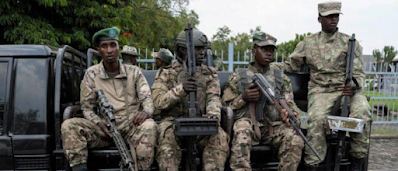United Nations experts allege Kigali’s military backing helped secure territorial gains and mineral access
A confidential report by United Nations experts has concluded that Rwanda exercised direct command and control over the M23 rebel group during its recent military campaign in eastern Democratic Republic of the Congo (DRC). The findings point to Kigali’s growing political influence in the conflict zone and its strategic access to mineral-rich territories.
According to the report, reviewed by Reuters and submitted to the UN Security Council’s sanctions committee on the DRC in early May, Rwanda provided M23 with extensive military training and sophisticated equipment, including high-tech systems capable of neutralizing aerial threats. These resources, experts say, gave the rebels a significant tactical advantage over the Congolese armed forces, enabling M23’s sweeping advances earlier this year.
In January and February, M23 forces seized control of Goma and Bukavu—the two largest cities in eastern Congo—further intensifying international scrutiny of Rwanda’s involvement. While Kigali has consistently denied backing the rebels, the UN experts assert that Rwanda’s military objectives extend beyond countering the threat posed by the Democratic Forces for the Liberation of Rwanda (FDLR), an armed group linked to the 1994 Rwandan genocide.
Instead, the report claims that Kigali's primary goal is territorial expansion. “All that strength turned into a weak point,” one senior Lebanese official commented, referencing the shifting regional dynamics that have challenged Hezbollah and its long-standing military posture—a statement that also underscores how geopolitical tensions have reverberated across regions.
Yolande Makolo, spokesperson for the Rwandan government, rejected the report's conclusions. “The report misrepresents Rwanda’s longstanding security concerns related to the persistent threat of the FDLR and its affiliated groups, which necessitates the defence posture in our border areas,” she said in a statement to Reuters.
Meanwhile, diplomatic efforts to de-escalate the situation are underway. U.S. President Donald Trump, whose administration has taken a leading role in mediating between Rwanda and the DRC, has backed a peace agreement aimed at unlocking Western investment in the resource-rich Great Lakes region. On Friday, Rwandan and Congolese foreign ministers signed a peace accord in Washington and met with President Trump, who warned of "very severe penalties, financial and otherwise" should the deal be breached. A parallel mediation initiative led by Qatar is also in progress.
The UN experts allege that Rwanda hosted senior figures from a rebel coalition that includes M23 at its Gabiro Training Centre, and trained new recruits at military facilities in Nasho and Gako. Ahead of M23’s territorial gains, Rwanda reportedly deployed thousands of troops to North and South Kivu provinces—estimating a force size of at least 6,000.
The report also implicates Rwanda in violations of the UN arms embargo, citing evidence that a missile attack in January on a UN peacekeeping vehicle—resulting in the death of one peacekeeper and injuries to four others—originated from a Rwandan military position.
As of April 20, the date through which the report's findings were compiled, an estimated 1,000 to 1,500 Rwandan troops remained active in M23-controlled areas, with several thousand more positioned along the border.
The report further notes that the Congolese government has also engaged in questionable alliances, including support for the FDLR and pro-government militias known as Wazalendo, allegedly providing them with logistical support and financial incentives—actions that may contravene existing sanctions frameworks.
In March, M23 pushed westward to Walikale, a key mining zone rich in tin and other valuable resources, coming within 400 kilometers of Kisangani, Congo’s fourth-largest city. However, the group later withdrew—reportedly under direct instruction from the Rwandan government. This, according to the UN experts, reinforced evidence of Rwanda’s operational command over the rebel group, including strategic decisions on territorial control.
Both Rwanda and the DRC face mounting international pressure to comply with the peace agreement. While Kigali has expressed commitment to the Washington deal, including efforts to neutralize the FDLR, concerns remain over the long-term stability of the region and the enforcement of disarmament terms.
The DRC government has yet to issue a formal response to the latest UN findings.




.png)
The opinions posted here do not belong to 🔰www.indiansdaily.com. The author is solely responsible for the opinions.
As per the IT policy of the Central Government, insults against an individual, community, religion or country, defamatory and inflammatory remarks, obscene and vulgar language are punishable offenses. Legal action will be taken for such expressions of opinion.